
10 Nutrient Dense Foods
Apr 06, 2023There’s only so much food you can eat (I like the phrase fill your cake hole with) in a day. Not only do you have to make sure you’re keeping your calorie intake in check, but you also can only fit so much in your stomach.
So what are you eating? Delicious, processed, and low-nutrient foods, or naturally nutrient-dense foods that pack a vitamin, mineral, fiber, and antioxidant punch? It’s pretty clear which the better choice is!
10 Nutrient Dense Foods
Here is a list of the ten most nutrient-dense foods to include in your diet. Try to eat them at least once a day, and you’ll give your body all (or most) of the nutrients required to stay healthy.
Kale
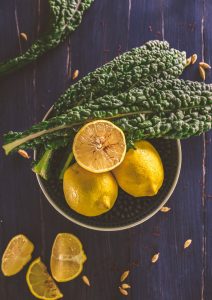
Of course kale is on this list! Even though there are some better foods out there it is still one of the top nutrient dense foods.
Many people groan at the thought of eating kale, due to the fact that it’s bitterer than your average leafy green.
Well, did you know that bitterness is the result of concentrated minerals, vitamins, and antioxidants? Each 100-gram portion of kale delivers:
- 1000% of your Vitamin K1 DV
- 200% of your Vitamin C DV
- 300% of your Vitamin A DV
Not only do you get a ton of these three important vitamins, but kale also delivers a hefty dose of copper, magnesium, manganese, potassium, and Vitamin B6. Plus, there’s 3 grams of protein and 2 grams of fiber in that same amount—with only 50 calories for the lot!
Kale also contains Indole-3-Carbinol and Isothiocyanates, bioactive compounds that are able to fight tumor cells.
Spinach is an alternative to kale, but kale doesn’t contain as much oxalates, calcium-binding minerals that prevent your body from absorbing this crucial mineral. When it comes down to it, no leafy green is able to compete with kale.
Salmon
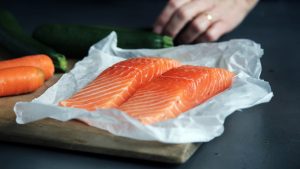
Fish is one of the best sources of protein on the planet. Not only does it contain all the amino acids required for building muscle, but it’s also rich in healthy saturated fats.
Specifically, Omega-3 fatty acids.
Omega-3s reduce disease risk, improve brain health, combat inflammation, reduce your chance of joint pain, boost cardiovascular health, fight oxidative stress, and the list goes on. More Omega-3 fatty acids are vital for your health!
Salmon is the best fish source of Omega-3s, with 2.8 grams per 100-gram serving. However, it’s also rich in:
- Magnesium
- Potassium
- Selenium
- B vitamins
Eating salmon at least once a week will do wonders to improve your health in every way. It’s a pricey fish, but 100% worth the expense when you consider how nutrient-dense it is!
Potatoes
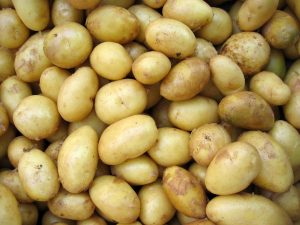
Hard to believe it, but potatoes really are one of the healthiest foods out there. Though they’re rich in carbohydrates, they’re also packed with a hefty dose of minerals and vitamins:
- Vitamin C
- Vitamin B6
- Potassium
- Iron
- Magnesium
- Copper
- Manganese
Potatoes actually contain a little bit of every nutrient your body needs to live, along with a good deal of fiber and enough starch to boost your energy levels.
Worried about the extra carbs? Try boiling the potatoes, then letting them cool before eating. As potatoes cool, the starch turns into resistant starch, a fiber-like substance that is actually VERY good for your health—and which won’t raise your blood glucose levels drastically.
In terms of healthy carbs, it’s hard to beat potatoes.
Seaweed
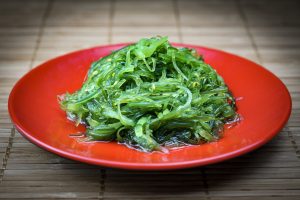
It may sound like a useless plant (thanks to the “weed” in the name), but seaweed is actually one of the healthiest, most nutrient-dense foods on the planet!
Seaweed contains hefty doses of certain minerals, including:
- Manganese
- Calcium
- Magnesium
- Iron
In fact, it contains more of these minerals than you’ll find in most land-based plants. Seaweed also contains bioactive compounds that are both antioxidant and anti-inflammatory.
The real reason you should eat more seaweed is due to its iodine content. Iodine is needed by your body to produce thyroid hormones, and a high-seaweed diet provides the mineral required for healthy thyroid function.
Nori, cooked seaweed, and seaweed supplements are all great options to consider to get more seaweed in your diet!
Shellfish
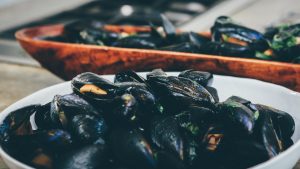
Shrimp, oysters, clams, lobsters, and crabs: all shellfish, and all surprisingly healthy.
Most shellfish contains a decent amount of protein—from 21 to 24 grams per 100 grams of cooked shrimp, mussels, and scallops—providing all nine essential amino acids required to build muscle.
However, it’s the mineral content of these shellfish that make them truly amazing.
For example:
- Clams contain a ton of metabolism-boosting Vitamin B12 (16 times the daily RDA in 100 grams), along with iron, selenium, Vitamin C, and potassium.
- Oysters contain a lot of immune-boosting zinc (6 times the daily RDA in 100 grams), along with Vitamin D, copper, and Vitamin B12.
Shellfish is one of the most nutrient-dense types of protein on the planet, making it a worthy addition to any diet.
Blueberries
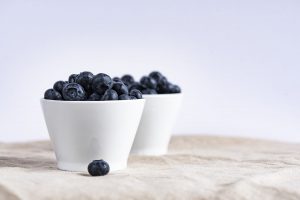
If you’re looking for an excellent source of antioxidants, look no farther than blueberries. This is superfood #2 behind the next one below.
Let’s be clear: blueberries contain more sugar than your average vegetable and fruit, and there’s less fiber, vitamins, and minerals than you get from some of the other foods on this list.
But when it comes to antioxidants, blueberries have few rivals. These little berries come jam-packed with anthocyanins (which give them their deep color) and phytochemicals, antioxidants that can improve brain health, reduce free radical activity in the body, boost cardiovascular function, and even combat tumor cells.
Studies have found that blueberries are able to:
- Improve memory in older adults
- Lower blood pressure
- Reduce markers of LDL cholesterol
- Increase antioxidant activity in the bloodstream
- Fight cancer cells
Best of all, they’re probably the most delicious food on this list!
Garlic

A true superfood if there actually was such a thing. Most people use garlic for two primary purposes: driving away vampires (and friends) and providing delicious flavor to your food.
However, it turns out garlic is one of the most nutrient-dense foods on the planet.
First off, it’s an excellent source of vitamins, including Vitamins B1, B6, and C. It’s also packed with minerals like selenium, copper, potassium, and manganese.
Second, and most important, it’s loaded with allicin, an active ingredient that offers a lot of health benefits:
- Reducing LDL cholesterol
- Boosting HDL cholesterol
- Lowering blood pressure
- Combatting inflammation in your body
- Reducing your risk of heart disease
- Fighting cancer, especially stomach and color cancers
- Killing fungi, bacteria, and other pathogens
Allicin is the nutrient that gives garlic its pungent odor and flavor—the thing that makes it delicious also makes it super-nutritious!
Sardines

They may be little fish, but boy do they pack a nutrient punch!
Thanks to their high saturated fat content, they are a very heart-smart food. They’re also loaded with the Omega-3 fatty acids that will fight inflammation, boost your heart and brain health, and keep your joints moving properly.
The fact that you eat the sardines whole—brain, bones, organs, skin, and all—means you get a lot of nutrients that you don’t get from other fish. Organs are among the most nutritious part of any animal, and they deliver a hefty dose of important minerals required by your body.
Mix them in a salad, pile them on a sandwich, or eat them alone: just make sure to eat them!
Dark Chocolate
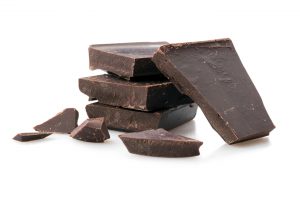
Of course we had to add this food to our list! It’s definitely the most delicious source of antioxidants on the planet.
The darker the chocolate, the higher the cocoa content. Cocoa is rich in nutrients, including:
- Fiber
- Manganese
- Copper
- Iron
- Magnesium
However, cocoa contains a broader variety of antioxidants than even blueberries, with more flavonoids and polyphenols to scavenge free radicals, fight cholesterol, lower blood pressure, enhance brain function, and reduce your risk of cardiovascular disorders.
If you’re going to eat dark chocolate, make sure to look for the stuff that has at least 70% cocoa—though up to 85 or 95% cocoa is better. Higher cocoa concentration means more of those antioxidants and minerals your body needs to be healthy.
Eggs

Eggs are among the top sources of protein on the planet. In fact, they contain more protein per gram than any other food on the planet. Incidentally this is #3 on my magical superfood list, which I don’t have but if I did these would be #3.
Most of the protein and a lot of the minerals are in the egg white, but don’t discount the egg yolk just yet. Egg yolks are also pretty rich in minerals, including:
- Lutein and Zeaxanthine, two antioxidants that can reduce eye disease risk , protect from macular degeneration, and improve eye health.
- Choline, a brain-boosting nutrient that the average person rarely gets enough of without consuming egg yolks daily.
- Omega-3 (found in enriched eggs), which is heart-smart and brain-boosting.
Worried about the cholesterol in egg yolks? Don’t be! Studies have proven that the cholesterol in egg yolks won’t raise your blood cholesterol levels. In fact, the saturated fats in eggs can actually help you to lose weight and boost testosterone.
If your goal is to eat clean and healthy, these are the ten foods you absolutely MUST add to your diet. Eating them will give you a lot of the important nutrients your body needs. Thanks to their high fiber, protein, mineral, vitamin, and antioxidant content, you’ll improve your health and keep your body in tip top shape!

